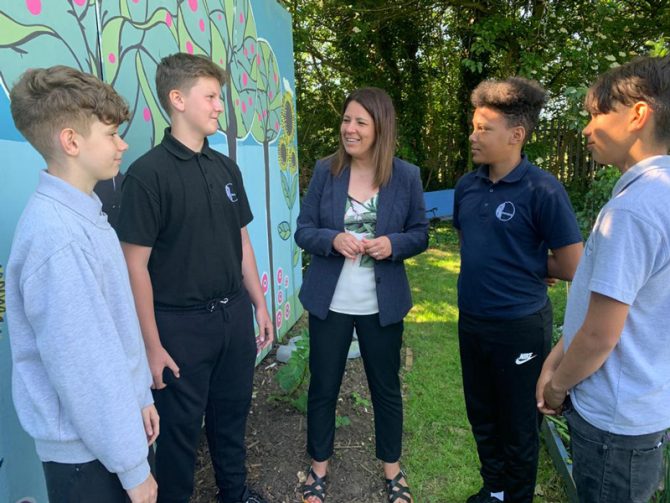Caron Johnson arrived to change alternative provision, and it changed her. After taking her school straight to ‘outstanding’, she explains what she wishes she’d known in mainstream
Caron Johnson, executive headteacher at The Rowans Alternative Provision Academy in Kent, hadn’t really intended to leave mainstream schools.
In 2010, her then-boss told her about a job at the nearby struggling provision, suggesting as a formidable assistant principal she would be well placed to help. More than a decade later, she didn’t expect to have stayed in the sector, explaining to the government why it’s important that new primary alternative provision can open in the area.
It was a massive shock to me
“I couldn’t believe what I was seeing,” she says of her initial arrival at the school. “It was awful. The children were loved and their welfare was of paramount importance, but in terms of curriculum, academic rigour, expectations of outcomes, future plans for them, that didn’t exist. It was a massive shock to me.”
It was partly a shock because, as a mainstream secondary teacher since age 24, who’d risen rapidly through the ranks, Johnson had never thought very hard about life for excluded pupils. She was known as a “strict teacher”, she tells me with a broad grin. “I’m embarrassed now when I look back, because when a young person was permanently excluded, in all honesty I didn’t really think about where they were ending up.”
Johnson herself was from the Medway area, and had been brought up by her mum, a strong, powerful character, and a loving and supportive stepdad. Finances were tight, but her mum was so determined for her kids that she booked Johnson’s PGCE interview herself, forcibly picking her up by car to make sure she attended it. “She told me, ‘You need to grow up.’ My mum taught us, don’t whine about what you don’t have, go and fight for it. She equipped me with the skills I needed to survive.”

By now a successful senior leader, Johnson told her head, with some reservations, she would move to The Rowans pupil referral unit to support improvement. “It was a lot of children doing what they wanted to do,” says Johnson with a wry smile.
Students were on a fixed diet of maths, English, science, ICT and art, and if “you didn’t like art, you did it anyway… The staff had lost links with any other type of school, and so were quite narrow in their thinking,” she continues. “They’d become Rowan-ised.”
Johnson was astonished at some of the attitudes: she was told certain pupils couldn’t take their maths lessons that day because of a distressing family event in the morning, for instance, or that assemblies should not be attempted. “It would be, ‘but we can’t put them all in one room – it’s just an opportunity for them to act up.’ It was, ‘you can do that in your mainstream school, Caron, but not here’.”
When Rowan’s head left, Johnson was invited to apply for the role. She wasn’t especially keen to join AP full-time. “I said, ‘No way, this is not where I want to be.’”

But then two things happened. First, she was showing around the school “a guy in a suit” who was interested in the headship. One of the year 11 boys, who didn’t think much of him, turned to Johnson later. “He said to me, ‘Are you actually going to let him run the school? Are you actually going to let that happen?’” And I thought, ‘He’s right. We’ve actually already made progress.’”
Secondly, Johnson spotted her deputy-to-be, Fiona May, teaching at a nearby school. Impressed, she persuaded May to join her.
A third thing had perhaps also happened. Johnson describes with admirable frankness the transformation the provision had already wrought on her – easily as much as she had changed it.
“At my old school when I walked down the corridor, they were quaking in their boots,” she says. “They were petrified of me, and I had no problem with that.”
Johnson had spent her career before The Rowans in a single-sex all-boys secondary modern, and was physically smaller than most of her charges. She felt she needed to be tough.
“If we were talking about outcomes, progress, behaviour management and controlling 30 boys, I was good at that. My view was, you do what you’re told. For 99 per cent of people that worked. But for the one child that didn’t fit, I wasn’t good at that.”
Just as much as Johnson had found a closed culture at The Rowans, she seems also to have found that mainstream was cut off in its own way. “I’d gone from being what I’d considered a highly skilled teacher, to being completely deskilled overnight. The pupils didn’t take any notice of me. I became acutely aware it was all about relationships.”

As Johnson brought in a new curriculum, high expectations, better behaviour – which some staff welcomed, while others left – her approach was changing, too.
“I’m still a strict teacher. Just this morning I gave a pupil short shrift for being quite rude, saying, ‘This is very disappointing.’ But the difference is that I’ve got a real relationship with her. I know when to be stern. And I know the young people who wouldn’t cope with me being upset with them, and to take a different angle.”
Having her own teenage sons also led Johnson to hear how children really feel about their teachers, she adds. Authentic relationships, where teachers show who they really are, matter to them.
In 2015, Ofsted arrived. The school went from special measures to ‘outstanding’ – such an unusual and rare leap the lead inspector had to talk it through with Ofsted HQ, says Johnson.
The report simply glows. “Teachers are expert at gaining students’ interest and challenging them to improve their work. Students respond extremely positively”; the “partnership between the headteacher and her deputy is the driving force behind the improvement in the school”; and perhaps most tellingly of all, “students make excellent progress, and for many of them, it is the first time they have experienced success in education”.

Of course, that report is six years old now, and there is always more to be done in alternative provision: 14 per cent of the year 11 students got five GCSE passes including English and maths in 2019-20.
Johnson is conscious of the paradox of alternative provision. The report says the majority of pupils will spend “the rest of their school career” at The Rowans – but she is clear they are best served in mainstream. Otherwise, the real world will be too much of a shock for them, she explains. They need to learn how to cope with larger class sizes and a wider society not trained in trauma-informed practice.
“Part of the problem at The Rowans is, we’re victims of our own success. The kids come and they don’t want to go.”
So now her team has secured sign-off from the Department for Education for a primary AP site, to break the cycle. Delayed since 2017 due to elections and the pandemic, construction of The Beeches will start next year and it will take pupils from as young as five to year 9.
Both will come under the trust headed by Johnson: The Inspiring Change MAT. The idea is to offer 12-week interventions – possibly longer – as a “service, rather than a school”. “There was lots of talk in the area about the need for primary behaviour support,” says Johnson. Fixed-period exclusions from primary schools increased from 2017 to 2019, government data shows.
“Now with the pandemic, that need has grown. The Beeches can’t come soon enough.” Johnson adds: “We’ve got children who I honestly believe, if we’d met them much earlier, they wouldn’t be here now.”
But isn’t the problem in mainstream itself? Isn’t the solution for more mainstream teachers to have Johnson’s epiphany? One of the senior leaders at The Rowans is set to return to a mainstream secondary school next year. For Johnson, though, she’s not keen to return.
“I think once you’ve worked in a specialist setting, it’s hard to go back into mainstream. I’ve got so many ideas, I think I’d be too much of a maverick now.” Perhaps that’s fine, and AP has simply gained a brilliant leader who suits it.
But perhaps mainstream – and staff who may be too stretched or inexperienced to focus on relationships – still needs to change too.














Your thoughts